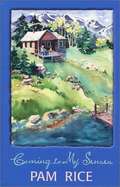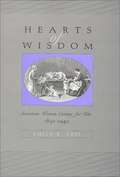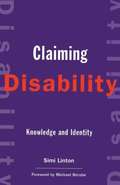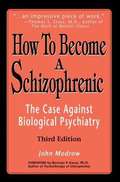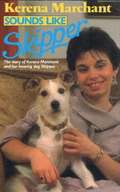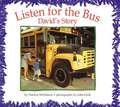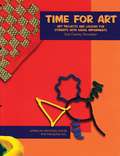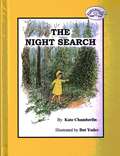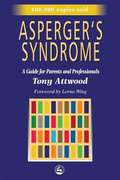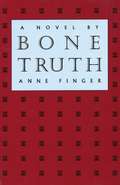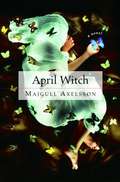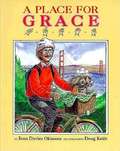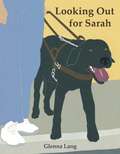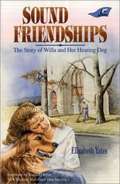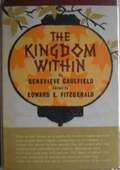- Table View
- List View
Coming to my Senses
by Pam RiceAddie Marsh is a grandmother, living in the small mountain town of Pinecliff, CO. She is becoming blind from macular degeneration and her son wants her to move intot he city in an assisted living complex. Addie joins a vision loss support group and slowly learns acceptance and new skills, and makes friends along the way. Throughout the story, she relives her life as a wife and mother of war casualties, from the 1930s forward.
Chip: The Story of a Guide Dog Puppy
by Miss Barlow's Fourth through Sixth Grade Special Education Students in Clovis CaliforniaFrom the Book jacket: Chip, The Story of a Guide Dog Puppy, chronicles the life of a guide dog from birth at the kennels to what happens if it does not make it as a working guide dog. Each year the learning handicapped students at Jefferson Elementary School in Clovis, California, welcome a puppy into their classroom to help their teacher socialize it for Guide Dogs for the Blind, Inc. The students wrote and illustrated this award-winning book. Meet the Authors and Illustrators L-R: Brandon Linn, Juston Smart, Megan Johnson, Hazael Gonzalez, Jordan Kedwards, Margaret Maskovich, Dominic Espinoza, Bonnie Jones, Chad Powers, and Hailey Ricord.
The Wounded Spirit
by Frank E. PerettiFrank Peretti's story of growing up with a medical condition that left him disfigured. Surgery and the miracle of prayer took care of the deformity, but not the reality of being different.
Hearts of Wisdom: American Women Caring for Kin, 1850-1940
by Emily K. AbelDrawing upon a wealth of diaries, letters, and case records from hospitals and social service agencies, the author examines the shifting roles of caregivers between 1850 and 1940. In addition to the diaries and letters of literate white woman, she turns to slave narratives from the antebellum south and records from health-care agencies serving American Indians during the first part of the 20th century. Abel shows that women in the 19th century gained self-esteem and status through their knowledge of home remedies and nursing techniques. The medical profession gained strength with the discovery of microbes and the development of medications to treat specific diseases. During the 20th century professionals discredited women who provided health care at home. One chapter discusses mothers of children with epilepsy or mental retardation, who were pressured to place their children in institutions and to sever emotional ties with them. Another chapter explores the shift from American sign language to oralism in the education of deaf children, and the impact this had upon mothers. Abel concludes by looking briefly at the current trend to return more and more caregiving to the home.
Every Teacher's Little Book of Wisdom
by Bob Algozzine Kate AlgozzineThis wee book is full of inspiring ideas, and good pointers on how to be the best teacher you can be. Written by two noted Special Educators these pointers apply to any teacher from Nursery school to a Ph.D. adviser. Worth the look if you are or want to be a teacher. "People with disabilities are just like everybody else. They have dreams, goals, and aspirations just like their neighbors and peers. When they are children, they deserve the same educational experiences as their neighbors and peers: Good teachers who hold high expectations for success; good teachers who know how to manage classrooms to maximize learning opportunities for all students; and, good teachers who teach them to read, to do mathematics, or to do anything else they need or want to learn. Nothing about having a disability limits an individual's desire to learn. Nothing about having a disability should limit the willingness of a teacher to teach. Good teaching is good teaching and there are no boundaries on where it can occur and who will profit from it. We believe this and try to make it happen whenever we teach. Now it is up to you."
Claiming Disability: Knowledge and Identity
by Simi LintonDisability studies in the humanities curriculum
How to Become a Schizophrenic: The Case Against Biological Psychiatry
by John ModrowThe author describes his experience as a diagnosed schizophrenic and then examines the medical model of schizophrenia, which he believes to be seriously flawed.
Sounds Like Skipper: The Story of Kerena Marchant and Her Hearing Dog Skipper
by Kerena Marchant<P>Skipper is a shaggy-haired Jack Russell, one of the earliest dogs trained in a new scheme to help people suffering from deafness. The author, a permanent researcher for BBC TV, has been deaf since infancy. Modern technology can equip her with a special high-powered hearing aid, but Skipper enables her to live alone, summoning her to doorbells and telephones, waking her when the alarm rings, and warning her of such unexpected hazards as burglars or fire alarms. The author's story of life with Skipper is full of insights into the plight of the deaf in contemporary society. <P>Kerena tells her story of how she received Skipper a Jack Russell terror mix dog, and how his presence changed her life. She also discusses some problems that she experienced as a almost deaf person in a hearing world, and her experiences with the deaf community too.
Listen for the Bus: David's Story
by Patricia McmahonThe story follows David a boy who is both blind and deaf as he experiences the world around him at home and in kindergarten.
A Teachers' Guide to the Special Educational Needs of Blind and Visually Handicapped Children
by Sally S. MangoldSuggestions and ideas from educational officials on how to provide additional support to blind students in the classroom setting.
Over My Head
by Claudia L. OsbornFrom the Book: A Doctor's own story of head injury from the inside looking out.
Time For Art: Art Projects and Lessons for Students with Visual Impairments
by Gail Cawley ShowalterThis simple manual gives some helpful suggestions for people who want to teach art to children who are blind or visually impaired. It also gives some suggestions on projects that the students can do. It is not intended as the "all around authority" on the topic but serves as a spring board into other projects and ideas. Topics and projects include, fake fossils, aluminum repousse, papier mache bowls, wire sculptures, and raised line drawings. Good book for anyone interested in ways to adapt lessons in art for learners with special needs. Also includes art projects which relate to science.
Tangerine
by Edward BloorPaul Fischer is not excited about moving to Florida with his family. And he is not happy about living the "Erik Fisher football dream" like his father is. Paul tries to sign up to play soccer at his new middle school but because of his Vision impairment is denied. But when a sink hole opens up beneath his school, he is given a new chance at Tangerine Middle School where be becomes a substitute but still can take pride in being a War Eagle. In the meantime, things in their new housing development are becoming difficult. Home owners complain about insects, robberies, a muck fire that will not go out, and the death of two people in the town. One by accident, he was being struck by lightning and another under shady circumstances. Paul sees things going on that his mom and dad are blind or or don't want to see. Can he get up the courage to tell the truth the whole truth and nothing but the truth, even if it will make his life at home very difficult? Great story for anyone interested in the underdog.
The Night Search
by Kate ChamberlinFrom the book jacket: Heather, who is blind, resists using her white cane until one night while camping her puppy wanders off. Heather tries to find the puppy. She finds a stick which helps, but she realizes that her white cane is a very valuable helper. This is a good book to use with the reluctant cane user, and for inservicing students showing the importance of the cane.
Running with Walker: A Memoir
by Robert J. HughesWhen Walker Hughes is two years old, a neurologist tells his parents that he has autism and concludes, "I have very little hope for this child." Walker's parents refuse to accept this grim prognosis. With boundless energy and breathtaking creativity they set about to enhance his skills and enrich his life. There is no miracle cure, no magic key that unlocks the door to Walker's inner world. Hughes vividly describes his son's severe disability and at the same time portrays him as an exuberant, loving, and utterly unique individual.
Bone Truth
by Anne FingerElizabeth Etter, a freelance photographer who had polio as a child, discovers that she is pregnant. As she struggles toward a decision about whether or not to carry the pregnancy to term, she looks back on her own family history. Written by an author who is active in the disability-rights movement, this is not a novel about disability per se. But Elizabeth's disability is an integral part of her character and of her story as it unfolds.
Alex: The Life of a Child
by Frank DefordFrank DeFord tells the heartbreaking, yet uplifting story of his daughter Alex's brief life. She died of cystic fibrosis at the age of eight.
April Witch
by Majgull AxelssonIn 1947 Ella Johansson gives birth to a child with severe cerebral palsy, and, on the doctor's advice, confines her to an institution and keeping her existence a secret. Later she becomes foster mother to three girls, each of whom was abandoned or abused. In their fifties these four "sisters," all related through their connection to Ella, try to make sense of their histories and to sort out their relationships with one another. Desiree, the "April witch" of the title, has the power to leave her body and enter the mind of another. Apart from these supernatural flights, her life in a series of institutions is depicted with painful realism. This is a thought-provoking novel, full of richly realized characters, which explores the profound need for unconditional love in childhood.
A Place for Grace
by Jean Davies Okimoto<P>Grace is a little dog with big dreams. She longs to be a seeing-eye dog, but is disappointed when she finds that she is too small for guide dog school. Grace isn't discouraged for long, though. She's discovered by Charlie, a deaf man who sees her perform a remarkable rescue and who knows a way she can use her eagerness and courage to help other people. <P>Charlie takes Grace to a hearing dog program, where she learns the skills dogs need to assist the hearing impaired throughout the day. School is difficult for Grace, but thanks to the flexibility of Mrs. Lombardi, the program director, and Charlie's encouragement, Grace finally succeeds in her own inimitable way. <P>A Place for Grace introduces children to the challenges of the hearing impaired and gives them the opportunity to see how people communicate through American Sign Language. Charlie uses some creative problem-solving to help Grace complete the hearing dog program; her struggles, hard work, and ultimate triumph make Grace an inspiring model for children facing obstacles in school and family life.
Looking Out For Sarah
by Glenna LangPerry a yellow labrador tells about a day in his life. Where he goes with his owner Sara to the park, to the post office, to a diner, and to a school where Sara tells about guide dogs. Perry also remembers the time Sara and him walked from Boston to New York to show what a Guide dog could do.<P><P> Winner of the Schneider Family Book Award
Sound Friendships: The Story of Willa and Her Hearing Dog
by Elizabeth YatesFrom the book Jacket: Sound Friendships is the story of Willa Macy, who lost her hearing when she was fourteen years old, and Honey, a golden retriever, who helped her to discover a new world of independence and security. It is also a story about Hearing Dogs-their background, training, special abilities, and the unique relationship they develop with their owners in working to surmount the barriers of a physical handicap.
The Kingdom Within
by Genevieve CaulfieldGenevieve Caulfield became blind as an infant, and was educated at the Perkins and Overbrook Schools for the Blind before attending college. When she was seventeen she became passionately interested in Japan, and determined to work there as a teacher. This memoir describes her long and careful preparations for her move to Japan, and her 14 years there as a teacher of English. In 1937, as Japan went to war in Manchuria and its relations with the United States deteriorated, Caulfield relocated to Thailand, where she established that nation's first school for blind children. Along the way Caulfield made innumerable friends, adopted a Japanese daughter, and raised her twin grandchildren after her daughter's tragic death. Life in Thailand during World War II is vividly portrayed in this memoir. This is a straightforward account by a woman of enormous determination and ability.
No Sight - Great Vision: A Centenary History of the Association for the Blind
by J. W. WilsonThis text provides a history of the Association for the Blind in Australia.
The Car, The Sled, and The Butch Wax
by Marc MaurerIn this book, successful people (who happen to be blind) tell stories which illustrate coping strategies while amusing the reader. Young adults will find courage in these true sharings. Can a person who is blind really do almost anything by using alternate techniques? What are those techniques? These eight people share a few of them. When a student teacher is faced with schoolchildren who have a sledding day planned, will a white cane be enough? Can a man without sight possibly rebuild a car's engine? When a young girl tests butch wax on her long tresses, does her hair ever return to its normal state? Whose fault is it when a person who is blind opens a taxicab door onto the side of a shiny, new SUV? These experiences delight, challenge and inform. This file should make an excellent embossed braille copy.
The World Under My Fingers: Personal Reflections on Braille
by Barbara PierceBraille: What Is It? What Does It Mean to the Blind?
